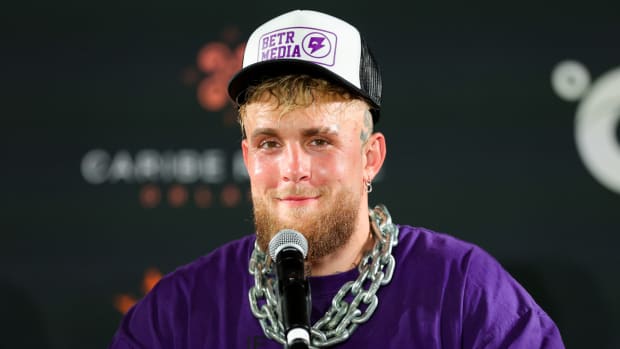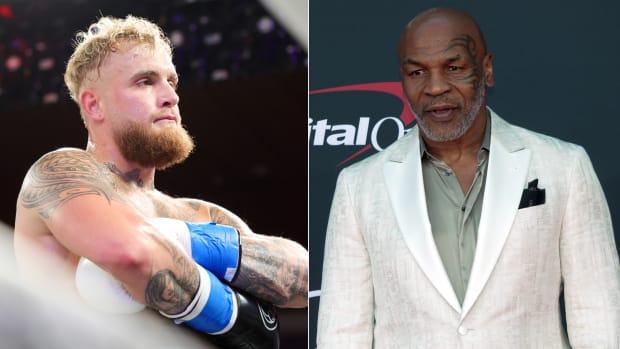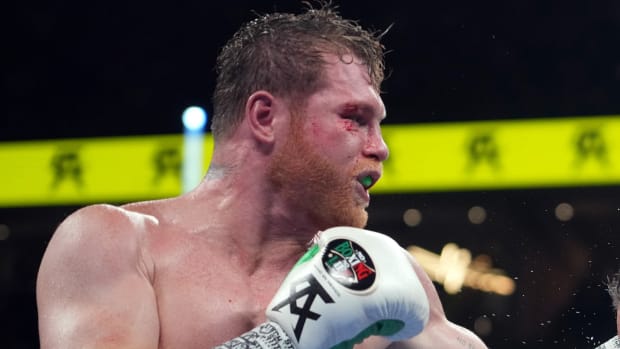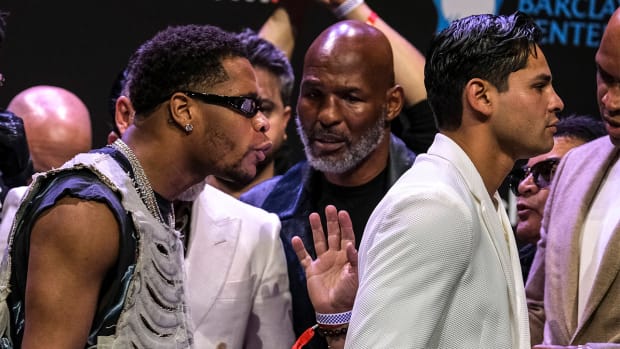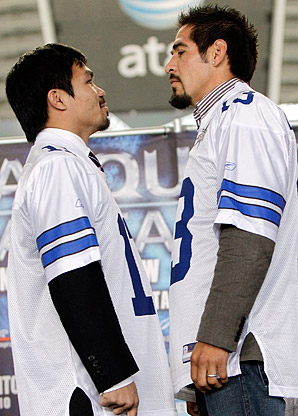
August in Review: Why Pacquiao took fight with disgraced Margarito
He could have gone toe-to-toe with 6-foot former welterweight champion Paul Williams and attempted to slay the giant in a true David-vs.-Goliath matchup.
He could have battled Timothy Bradley, the skilled American who has positioned himself as the top dog in the 140-pound division.
He could have fought anyone, Manny Pacquiao, and he chose ... Antonio Margarito.
A year and a half ago, a Pacquiao-Margarito fight would have created considerable buzz. Back then, Pacquiao was riding a wave of momentum after sending two of boxing's finest -- Ricky Hatton and Oscar De La Hoya -- into retirement in brutal fashion. Margarito, in turn, had established himself as the most feared fighter in boxing after dropping Kermit Cintron and putting a savage beating on Miguel Cotto.
But a lot has changed in two years. Pacquiao, 31, is still on the rise, but Margarito, 32, has taken a precipitous fall. In January 2009, Margarito was caught trying to load his wraps with a plaster-like substance before his fight with Shane Mosley. The California Athletic Commission suspended Margarito for one year and last month declined to re-license him at a hearing.
Texas did, however, which is why Pacquiao and Margarito will step into the ring Nov. 13 at Cowboys Stadium in Arlington, Texas, and fight for the WBC super welterweight title.
The question is, Why?
It wasn't Freddie Roach's idea. Roach, like everyone else, wanted Pacquiao to fight Floyd Mayweather. Roach fielded phone calls for months from Top Rank promoter Bob Arum about the details of a Mayweather fight. Arum would ask, What kind of gloves do you want to use? What size ring will you sign off on?
Roach even helped persuade Pacquiao to accept any form of random drug testing. Not with a 24-day window. Not with a 14-day window. Any form of testing.
"I was stunned when he turned us down," Roach said. "I thought for sure we would have a deal."
They didn't, so Roach and Pacquiao had to move on. And Roach knew exactly which opponent to pursue. He didn't want Margarito. Roach is from the old school. A fighter who did what Margarito tried to do, Roach reasons, has no place in the sport.
"Personally, I wanted Marquez," Roach said. "I thought we beat Marquez both times, but I'd like to shut him up. I really would. A lot of people think Marquez has Manny's number. I think differently. I think we could knock him out this time."
Roach's lobbying for Marquez fell on deaf ears. A fight with Marquez meant cutting a deal with Golden Boy, Top Rank's arch-nemesis in the industry. Margarito, on the other hand, was in house and in desperate need of a big fight to regain his status in the sport.
On this, Pacquiao was silent. He could have vetoed the fight. Arum might have fought Roach, but if Pacquiao had stepped up and said he wanted no part of the notorious cheater, Arum would have listened. But Pacquiao didn't. In fairness, Pacquiao had wanted to fight Margarito for some time. In the days after his win over De La Hoya, Pacquiao prodded Roach with suggestions on how to beat Margarito.
"He really wanted it," Roach said. "He said he would destroy him."
By denying Margarito, Pacquiao could have sent a powerful message that cheaters will not be tolerated. It's a message Arum wasn't willing to send. Neither was HBO. The network won a 2010 Emmy award for Assault in the Ring, a documentary about the 1983 fight between Luis Resto and Billy Collins, a match in which Resto was caught having removed the padding from his gloves. Collins committed suicide a year later and Resto and his trainer, Panama Lewis, were barred from the sport.
Now, HBO is prepared to support a man who attempted to do the same thing. The network will hype the fight with its Emmy-winning reality series, 24/7, a show that will most certainly add to Margarito's eventual payday.
Pacquiao could have stopped this. It wouldn't have cost him a nickel. The fans would show up for someone else. Some 51,000 fans came through the turnstiles to watch Pacquiao use Joshua Clottey as a human punching bag in March. Margarito is expected to draw thousands of Mexican fans, but his popularity pales in comparison to that of Marquez, a Mexican legend who ranks among the top-five fighters in the world today.
It's the biggest fight of the year, Pacquiao-Margarito. And at the same time, it's a fight no one wants to see. -- Chris Mannix
Requiem for a Light Flyweight? That may not have quite the resonance of the classic Requiem for a Heavyweight, but after Ivan Calderon's defeat at the relentless hands of Giovanni Segura on Aug. 28, it seems a good time to pay tribute to one of the most accomplished little fighters of his era. Calderon is 35 now and -- to judge by the way he wilted against the buzz-saw pressure of Segura -- in the twilight of his career. But what a career it has been.
Since turning pro on Feb. 17, 2001, the 5-foot Puerto Rican has run up a record of 34-1-1, while winning championships at 105 and 108 pounds. His record in title fights before he met Segura was 18-0-1. Never a big puncher (just six career KOs), Calderon built his success on speed and superbly smooth and methodical boxing.
The bout with Segura -- an action-packed brawl that some observers are calling a candidate for Fight of the Year -- was an anomaly for Calderon; he has always been far more about brilliant craftsmanship than about fireworks. He was, however, capable of a bit of flash when he wanted. Back in 2007, Freddie Roach brought Calderon into the gym to spar with Oscar De La Hoya, figuring it would do Oscar good to work with a smaller, faster boxer. Not so much.
"Calderon slapped Oscar around like it was unbelievable," Roach said later.
Whatever Calderon decides to do at this point, his legacy is secure as one of the finest in Puerto Rico's long line of world champions -- and as one of the true pound-for-very-few-pounds fighters of the last decade. -- Rich O'Brien
Segura unified the junior flyweight tiles with his eighth-round stoppage of Calderon.
